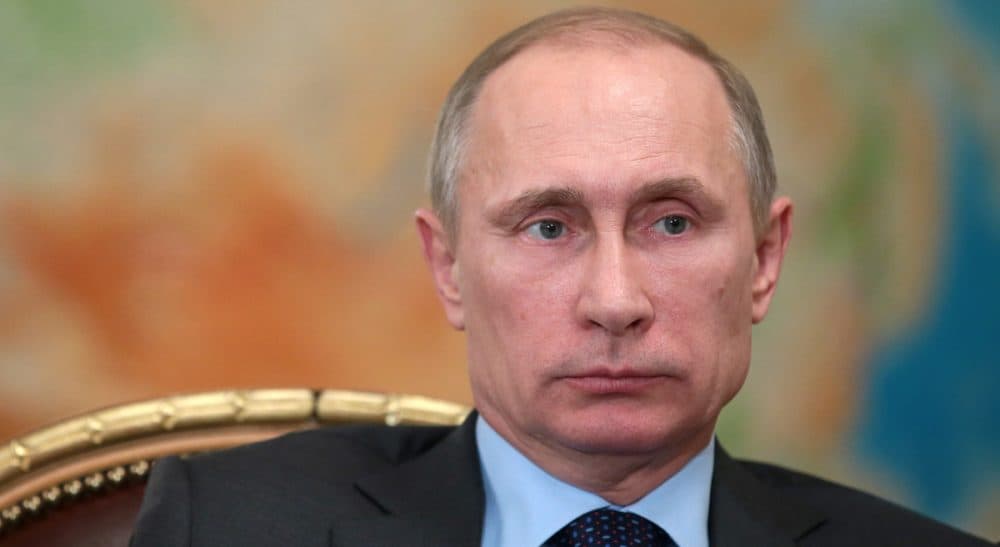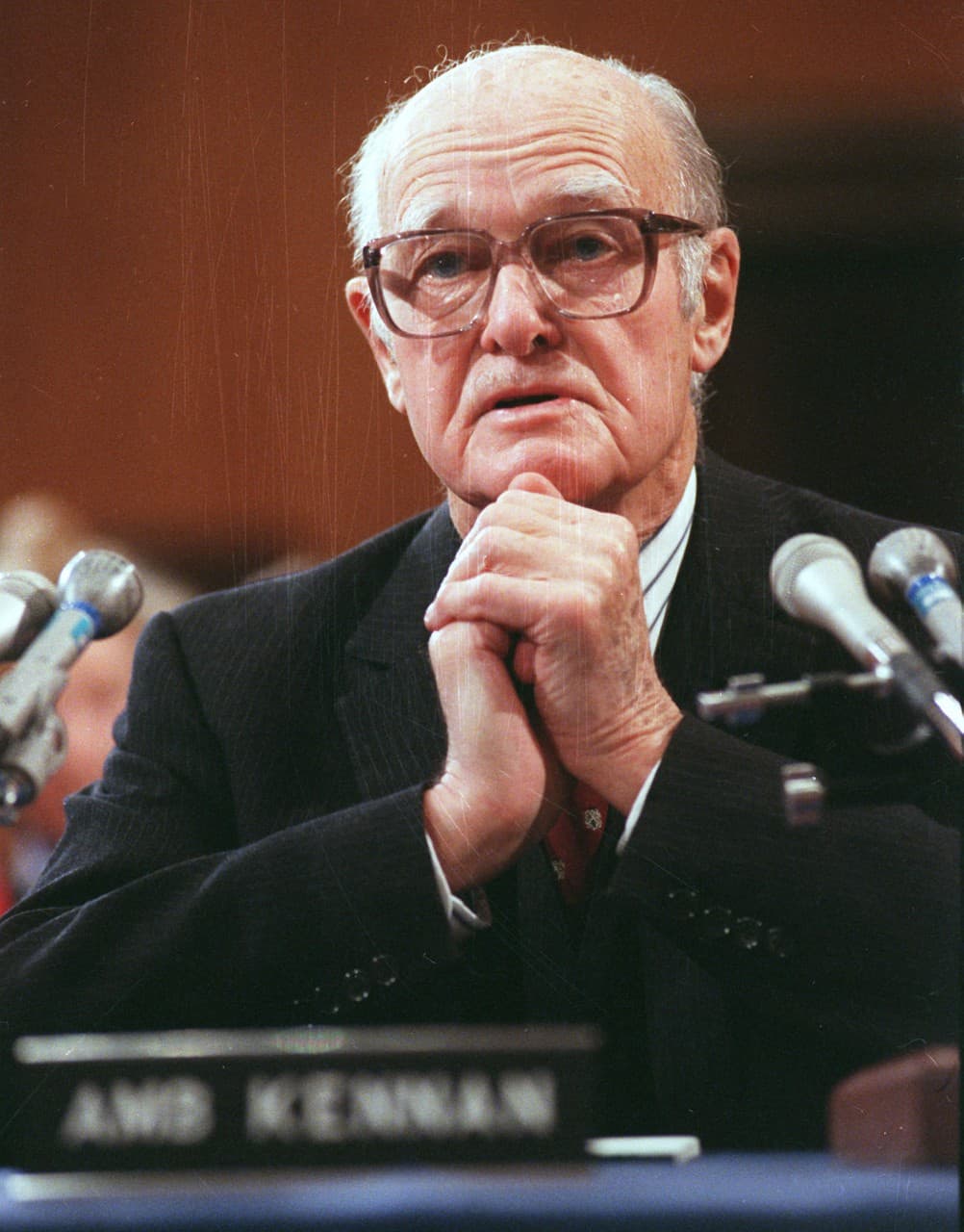Advertisement
'X' Marks The Spot: Vladimir Putin As Explained By George Kennan

In order to understand Vladimir Putin's recent power grab in Ukraine, it is perhaps necessary to consult with the celebrated oracle of modern Russian history: George Kennan.
Granted, this longtime diplomat and acknowledged "Wise Man" of post-World War II American foreign policy has been dead for almost a decade, but his 1947 seminal analysis, "The Sources of Soviet Conduct,” otherwise known as the “X Article,” can still be of great value when examining Putin’s precipitous actions.
According to Kennan, Russia always possessed a chip on its shoulder when it came to dealing with the economically superior West, especially under the totalitarian rule of Joseph Stalin, who Putin now assiduously tries to emulate in public.
In order to understand Vladimir Putin's recent power grab in Ukraine, it is perhaps necessary to consult with the celebrated oracle of modern Russian history: George Kennan.
Fearing “a capitalistic encirclement” from the West, which they feared would spell eventual doom for their authoritarian-nationalist regimes, Russian leaders of the past century consistently opted for territorial expansion as an answer to their geopolitical dilemma. For such aggression was deemed necessary due to the believed “hostile” intent of their neighbors and a driving sense of “duty” to “overthrow the political forces beyond their borders.”
“Their sense of insecurity was too great,” Kennan maintained.
Putin seems to be of a similar mindset. In a recent interview, he claimed that Ukrainian opposition to Russian military aggression in Crimea was the product of an elaborate conspiracy hatched from within the United States. “I have the feeling that they sit somewhere in America over a big puddle and conduct experiments, as if with rats, without understanding the consequences of what they are doing,” he said earlier this week to a handful of Kremlin pool reporters.
Such comments also reveal a disturbing belief in what Kennan called “the infallibility of the Kremlin.” Putin is just the latest in a long line of Russian rulers who view themselves and their regimes as “the sole repository of truth.”
“For if truth were to be found elsewhere,” Kennan points out, “there would be justification for its expression in organized (Russian) society. But it is precisely that which the Kremlin cannot and will not permit.”

Put another way, there can be no room for dissenting voices whether they be the irreverent rock band Pussy Riot, defiant gay rights activists or the 37-year-old crusading lawyer turned internet blogging sensation Alexei Navalny. Navalny, who unsuccessfully ran for Moscow mayor in 2013 and who is now under court-ordered house arrest, has publicly called out the regime for its massive corruption and elaborate smear campaigns against political opponents. “When they constantly tell these fairy tales — about how in Holland there is a party of pedophiles, or how in the USA people are in prison for gay marriages or homosexual relationships — it works well inside the country,” Navalny told the Huffington Post’s Luke Johnson, “but outside the country [Putin] has a big problem.”
That problem was in full evidence during the just concluded Winter Olympics in Sochi, which Putin tirelessly tried to promote as a propaganda showcase for his regime. Navalny believed that Putin was “strongly irritated” by questions from international journalists pertaining to the Russian Federation’s official policy of persecution toward members of the gay, lesbian, and transgender community.
Yet Putin was loath to display such personal irritation openly, just as he is reluctant to get openly emotional about questions touching upon his controversial policy toward Ukraine. As Kennan observed, Russian leaders have traditionally been “keen judges of human psychology, and as such they are highly conscious that loss of temper and self-control is never a source of strength in political affairs.”
Kennan added that they are quick to take advantage of such “evidences of weakness” in others, however. “For these reasons it is a sine qua non of successful dealing with Russia that the foreign government in question should remain at all times cool and collected and that its demands on Russian policy should be put forward in such a manner as to leave the way open for compliance not too detrimental to Russian prestige.” The Obama Administration would be wise to keep this advice in mind when formulating a policy response to Putin’s Crimean incursion. But the horse may have already departed from the proverbial the barn in this respect.
Russian leaders have traditionally been 'keen judges of human psychology, and as such they are highly conscious that loss of temper and self-control is never a source of strength in political affairs.'
Amb. George Kennan
For in his final years Kennan made it a point to argue that the end of the Cold War did not mean the end of longstanding Russian paranoia toward the West. Indeed, he predicted that U.S. efforts to extend its military alliance system (N.A.T.O) deep into the heart of Eastern Europe, a former Soviet sphere of influence, would bring only adverse consequences. “Such a decision,” he claimed in a 1997 New York Times opinion piece, “may be expected to inflame the nationalistic, anti-Western and militaristic tendencies in Russian opinion ... to restore the atmosphere of the cold war to East-West relations, and to impel Russian foreign policy in directions decidedly not to our liking.”
Sound familiar?
Seen in this light, Putin is merely following a well-trodden historic path, one that unfortunately threatens the peace and security of the entire world.
We have been forewarned.
Related:
